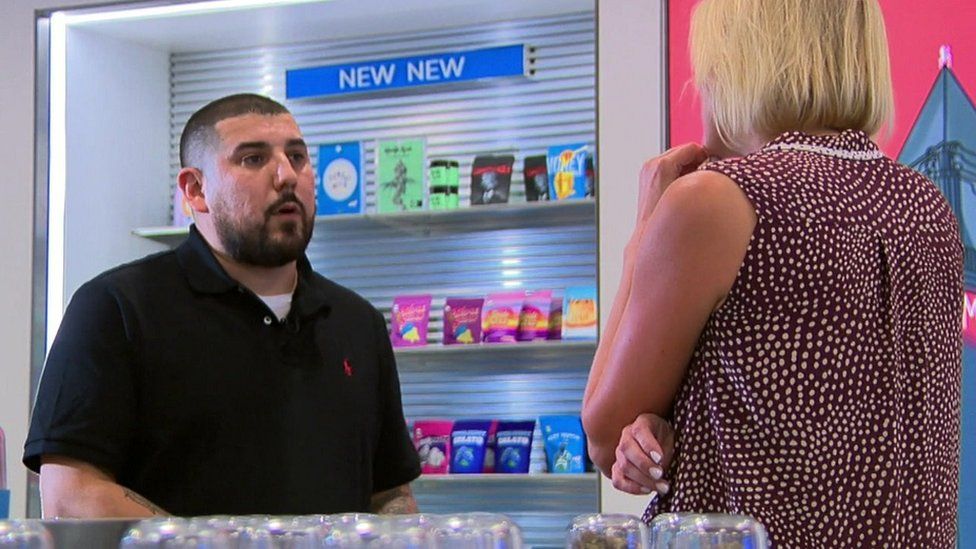By Samantha Granville & Sophie Long -BBC News
Merced County sits in the middle of California’s Central Valley.
For as far as the eye can see, there are identical rows of crops, with the occasional farmhouse or family home.
One of these homes looks unassuming from the outside.
There’s nothing unusual about the building or the land around it, except that there’s a small group of women, wearing pristine white habits, burning incense, and singing hymns as they walk in step blessing their cannabis plants.
These women are the “Sisters of the Valley,” better known as the Weed Nuns.
Lead by Sister Kate, the women are members of a self-proclaimed enclave of nuns who identify as healers and feminists, but more importantly, business people. They do not represent an official religion.
“I chose an industry that is messed up,” Sister Kate says. “It’s going to probably be messed up and I’m probably going to have to do a lot of dancing and sidestepping.”
She’s referring to all the confusing technicalities in the laws surrounding California’s cannabis industry.
California is home to the so-called “green rush” of cannabis production. It was the first state to legalise medical marijuana in 1996, and recreational use has been legal since 2016.
The state’s law, however, is full of regulatory loopholes, which means the legality of marijuana cultivation varies from county to county and city to city.
So while it’s legal to use cannabis in the state, nearly two-thirds of California cities have banned marijuana businesses, with others making it extremely difficult to obtain permits.
This means that for the Sisters of the Valley, growing their 60 plants outside, here in Merced County, does not fall within the law.
“The sheriffs know that, they just let me do this,” admits Sister Kate. “But there’s really no reason for them to let me.
“They could have shut me down by now just because it’s illegal to grow hemp [cannabis] in this county.
“But I think that they know we will just challenge the law and get it changed then in the county… And I think they know it would be a fight they don’t want to undertake.”
There’s a second home on the property which the sisters call “the abbey”- it’s where all the medicine-making takes place.
Sister Camilla carefully pours super-strength CBD oil into tincture bottles.
They produce and sell all their own hemp-based medicines and salves, a business that before the pandemic was grossing $1.2m a year (£1m).
Despite praying for, and blessing every batch, they’re now making half that.
Selling through dispensaries might help them rebuild, but that would mean even more regulations, and higher taxes.

Twenty miles down the road, in downtown Merced, Joel Rodriguez, who runs the local cannabis shop, is operating legally.
However, California has put so many taxes in place on the cannabis supply chain, Mr Rodrigez says it is putting people out of business, or pushing people to operate outside the legal regulations.
He is one of many cannabis businesses in California that complain of stifling taxes and high operating costs.
“Dealing with the tax rates as well as having the overheads that black-market dealers don’t have to deal with – rent insurance payroll, just basic stuff like internet – those kinds of things we have to deal with everyday, we can’t write that off, and that all goes into the end cost for the customer.”
The initial application fee for a retail license in California is $1,000.
After that there are annual state administrative and regulatory fees that can add up to tens of thousands of dollars a year for small businesses, and close to $100,000 for larger operations.
Operating legally is much more expensive than operating illegally, acting as an incentive to dealers.
The illegal trade in marijuana is estimated to be worth around $8bn, roughly twice as big as the legal trade in California in 2021.
One underground dealer, who did not want to be identified by name, says he can offer a better product and make more profit by working outside legal parameters.
“Just trying to get that license is going to cost you about a million dollars,” he says. “And in the industry that we’re in, you can accumulate a million dollars just off of doing what you’re doing by making it available to everyone who doesn’t have a card or doesn’t have a car to get to a club.”
Read the entire article here
